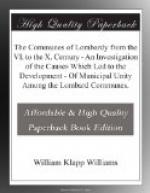I do not mean to imply that we must in any measure ignore the passive force and influence of the old forms on the new. The old veins receive the new blood; the new torrent, overrunning everything at first with the strength of its new life, will find again, even if it deepen, the channel of the old river: a vanquished civilization will always subdue and at the same time raise its barbarous conquerors, if they come of a stock capable of appreciating civilizing influences. In the present case this means that the men of the North brought the new ideas that were to form modern history, and let their growth be directed and assisted, while they were yet too young to stand alone, by some of the framework which had been built up by the long experience of their Southern neighbors.
To focus this thought on the immediate subject of our present study, this I think is the only and true solution of the tedious question, so much discussed by the two opposing schools of thought: whether the government of the Italian communes was purely Roman in its forms and in its conception, or purely Teutonic. The supporters of neither theory can be said to be in the right. You cannot say that the average city government was entirely Roman or entirely Teutonic, either in the laws which guided it, or in the channels by which these laws were executed and expressed. I think much time and much learning have been spent on a discussion both fruitless and unnecessary. We cannot err if we subject the question to a consideration at once critical and impartial.
The widely differing opinions eagerly supported by different writers on this point, form a very good example of the deceiving influence of national feeling on the judgment in matters of historical criticism. For, on the one hand, we find many German writers ignoring entirely the old framework of Roman organization, and recognizing only the new Teutonic life which gave back to it the strength it had lost; on the other, a host of lesser Italian writers who magnify certain old names and forms, and mistake them for the substance, making all the new life of Italy but the return of a past, which belonged to a greatness that was dead. Many there are of this school in Italy, where you will often find to-day a commune of three hundred inhabitants, with its one or two constables wearing the imperial badge, “Senatus Populusque Albanensis” or “Verulensis,” as the case may be. Truly a suggestive anachronism! It is true that in remote ages especially, when the records of history are few and uncertain—and the period we are considering in this paper can almost be called the prehistoric age of municipal institutions in Northern Italy—much can be learned and much truth inferred from the evidence of a name. But this is a species of evidence we can never be too cautious in using, as the temptation is always to infer too much rather than too little.




